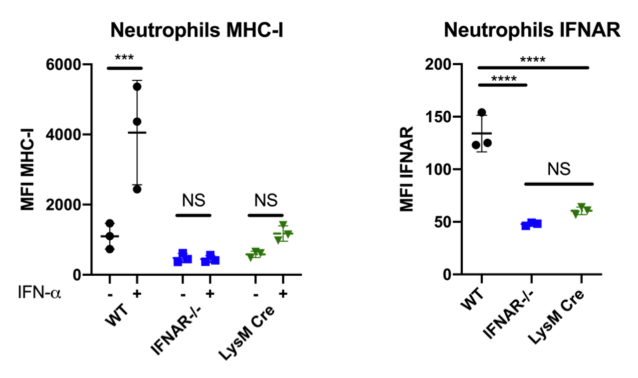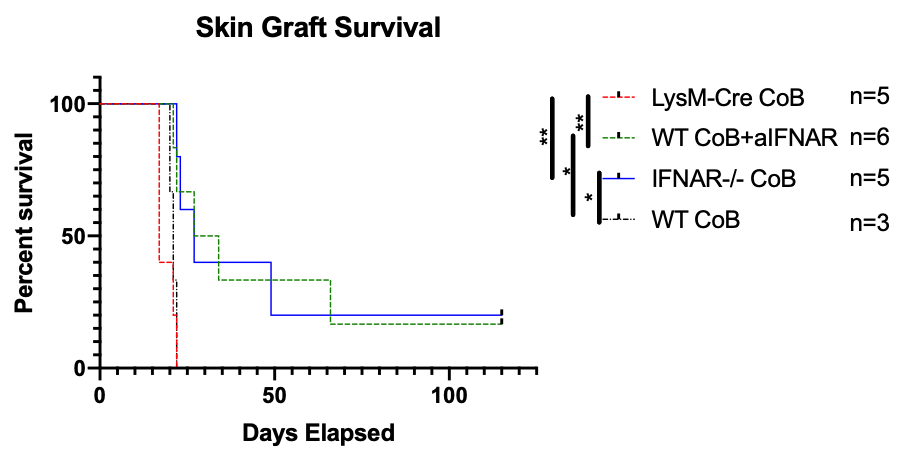Ifnar Signaling on Myeloid Cells Does Not Contribute to Costimulation Independent Transplant Rejection
Emory University, Atlanta, GA
Meeting: 2020 American Transplant Congress
Abstract number: B-336
Keywords: Co-stimulation, Mice, knockout, Skin transplantation, Tissue-specific
Session Information
Session Name: Poster Session B: Acute Rejection
Session Type: Poster Session
Date: Saturday, May 30, 2020
Session Time: 3:15pm-4:00pm
 Presentation Time: 3:30pm-4:00pm
Presentation Time: 3:30pm-4:00pm
Location: Virtual
*Purpose: Costimulation blockade (CoB) is a promising new strategy that provides a more targeted therapy with fewer side effects compared to traditional transplant immunosuppressants, leading to improved long-term graft and patient outcomes. However, acute costimulation independent rejection is a concern for a subset of treated patients. Type I interferons (IFNs), which signal through the type I IFN receptor (IFNAR), are produced in response to innate immune signals and may prime the adaptive immune system for acute rejection. We have previously demonstrated that blockade of IFNAR signaling significantly prolongs graft survival. Here we sought to investigate the role of IFNAR signaling on myeloid cells during costimulation blockade resistant rejection.
*Methods: In order to assess the contribution of IFNAR signaling on myeloid cells we generated LysM-Cre IFNARfl/fl mice that do not express IFNAR on monocytes, macrophages, or neutrophils. We confirmed their phenotype by stimulating neutrophils overnight with 1000IU of IFN-α, which induced the upregulation of MHC-I on neutrophils from wildtype C57BL/6 mice but not IFNAR-/- or LysM-Cre IFNARfl/fl mice (left). LysM-Cre IFNARfl/fl neutrophils expressed minimal IFNAR, equivalent to neutrophils from IFNAR-/- mice, compared to wildtype cells. Statistical differences were determined by one-way ANOVA using Tukey’s multiple correction test. *** = p<0.0005. **** = p<0.0001.
*Results: We then assessed the survival of fully MHC mismatched BALB/cJ skin grafted onto C56BL/6 wildtype, IFNAR-/-, or LysM-Cre IFNARfl/fl mice treated with CoB (CTLA4-Ig + anti-CD154) with or without anti-IFNAR. We found that LysM-Cre IFNARfl/fl recipient mice show no survival benefit compared to IFNAR-/- recipients treated with CoB or wildtype mice treated with CoB + anti-IFNAR, compared to wildtype mice treated with CoB alone.
*Conclusions: The results from this experiment suggest that IFNAR signaling on myeloid cells does not contribute to costimulation blockade independent rejection. Future experiments are underway to evaluate the contribution of IFNAR signaling on other cell types in this setting, specifically T cells.
To cite this abstract in AMA style:
Habib J, Mathews D, Dong Y, Stephenson A, Adams A. Ifnar Signaling on Myeloid Cells Does Not Contribute to Costimulation Independent Transplant Rejection [abstract]. Am J Transplant. 2020; 20 (suppl 3). https://atcmeetingabstracts.com/abstract/ifnar-signaling-on-myeloid-cells-does-not-contribute-to-costimulation-independent-transplant-rejection/. Accessed July 18, 2025.« Back to 2020 American Transplant Congress


